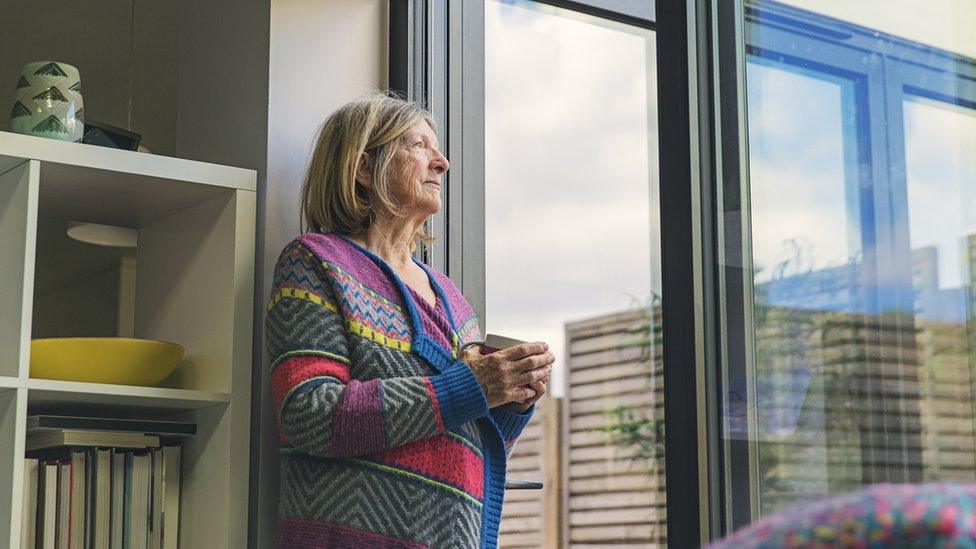Covid-19: Swann hopeful for 'beginning of the end' of pandemic
- Published
- comments
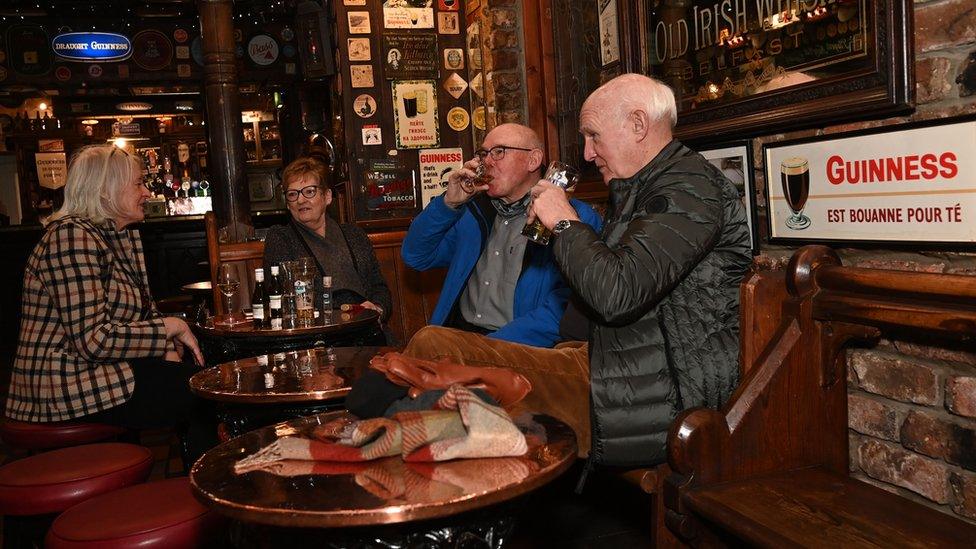
Hospitality restrictions have been relaxed in Northern Ireland
Health Minister Robin Swann has said he hopes further relaxations of Covid restrictions signal "the beginning of the end" of the pandemic.
On Friday, rules on self-isolation and table service in pubs and restaurants in Northern Ireland were relaxed.
Next week, nightclubs will reopen and vaccine passports will not be needed to enter pubs, restaurants or cinemas.
But Mr Swann said working from home guidance "still stands" and that it would be removed on a "phased" basis.
In England, the advice to work from home has been removed, but in Northern Ireland the guidance is that people should work from home if they can, with employers "encouraged to facilitate this".
Northern Ireland is coming to end of this wave of coronavirus, if not the pandemic, says Robin Swann.
'Full stock-take'
On Friday, the health minister told BBC News NI that any further changes would be in line with health advice and would be made clear by the executive.
He also said there would be a "full stock take" by Stormont ministers of the remaining Covid regulations at their meeting on 10 February, including the laws on mandatory wearing of face coverings.
"I would encourage people to continue to wear them where appropriate, face coverings have played a vital role in our daily protection," Mr Swann added.
The minister also said it was "hugely frustrating" that details of planned changes to Covid rules were leaked to the media ahead of Thursday's executive meeting.
Infrastructure Minister Nichola Mallon said she had found out about the proposals through media outlets, rather than receiving detailed papers from ministerial colleagues.
A Bangor restaurant owner says his business has suffered due to measures now being eased.
Mr Swann said it was "not a good way to do government or governance" and said it had been a regular occurrence during the past two years of the pandemic.
"Sometimes the executive message has been divided, but that's been caused by messages being leaked before ministers have even had a chance to discuss them," he added.
'Moving in right direction'
He also said while people needed to continue to exercise a level of caution, he was optimistic that "we are moving in the right direction" and thanked people for making continued sacrifices.
The minimum period of self-isolation for those with Covid in Northern Ireland has changed to five full days from seven.
People who test positive will need to produce negative lateral flow tests on day five and day six to end their period in isolation.
As of noon on Friday, premises that serve alcohol were able to drop table service.
The rule of six - in which tables are limited to up to six people from no more than six households - was also lifted.
Other rule changes that came into force at noon included:
Guidance limiting the number of households meeting indoors to three will be removed
The requirement to provide proof of exemption for not wearing a face covering will be removed with the excuse of "severe distress" reintroduced
The guidance on working from home will revert to doing so where you can, with employers encouraged to facilitate this
Further rules are due to be relaxed from noon next Wednesday, 26 January, including dropping the use of vaccine passports at pubs, restaurants and cinemas, the reopening of nightclubs and the resumption of dancing and indoor standing events.
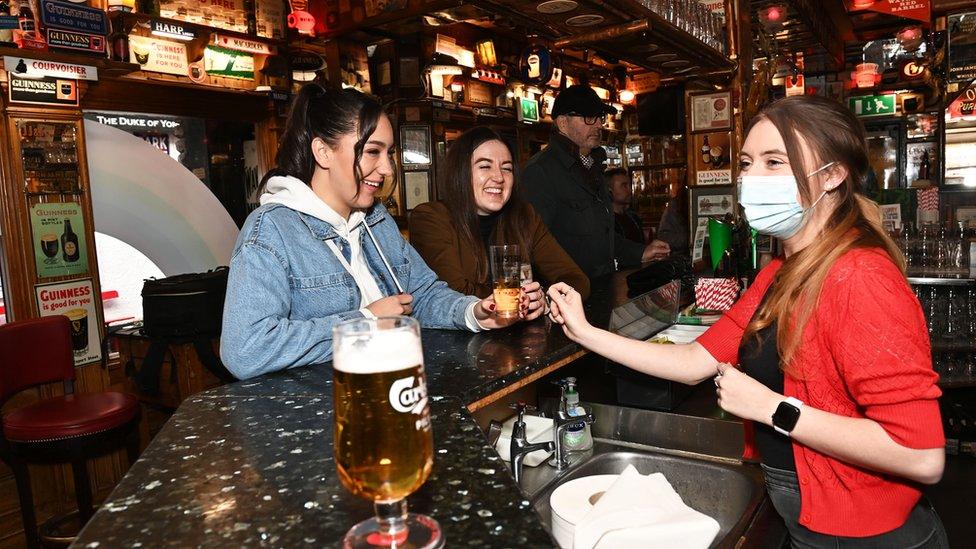
Table service is no longer be required at premises that serve alcohol
Vaccine passports will still be needed for nightclubs and indoor unseated and partially-seated events with 500 or more people in attendance.
Also from 26 January, the need for offices to "take reasonable measures for 2m (6ft) social distancing" will be removed, although risk assessments should be carried out.
The moves were agreed at a Northern Ireland Executive meeting on Thursday, with ministers due to review all remaining Covid restrictions again on 10 February.
The restrictions that have been eased came into place just after Christmas in a bid to manage the number of cases of the Omicron variant.
First Minister Paul Givan described the changes as a "step in the right direction" and said they reflected the changing circumstances in Northern Ireland.
Deputy First Minister Michelle O'Neill said it was "clear we were past the peak" in terms of coronavirus case numbers and the number of Covid-19 patients in hospital.
At their meeting on Thursday, ministers were advised by health officials that there may be a "secondary peak" in cases in the next two weeks as a result of further spread in school-aged children, but that existing measures would be "sufficient" to manage hospital admissions.
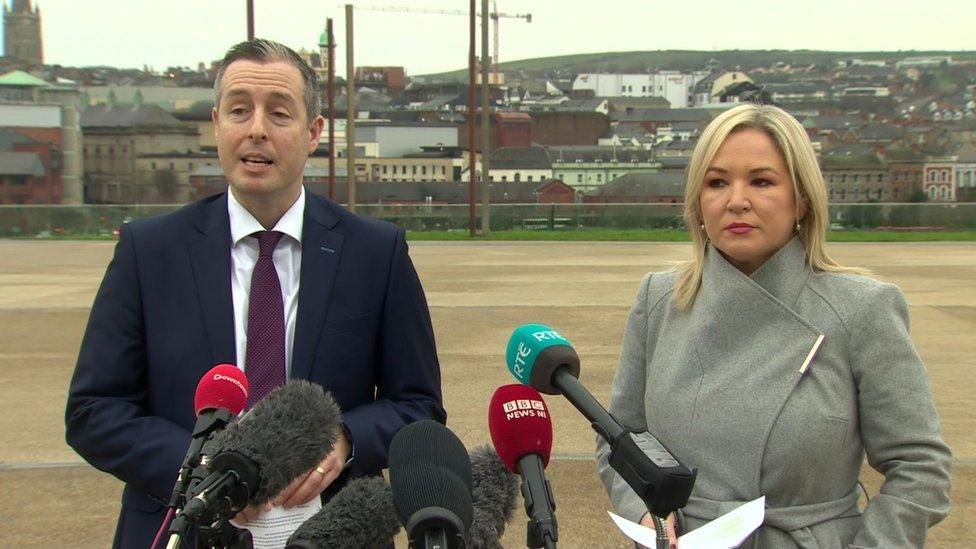
Paul Givan and Michelle O'Neill announced the changes to the rules while on a visit to Londonderry
Mr Givan also said the next executive meeting on 10 February would be an important one, when other measures would be discussed, adding that he wanted changes to the rules regarding face coverings.
The decision to drop the need for vaccine passports was welcomed by several trade bodies.
Angela McGowan, the Northern Ireland director of the Confederation of British Industry, said companies would be hopeful that "we are finally starting to turn the corner on Covid-19".
Hospitality Ulster chief executive Colin Neill said the moves would provide "incredible relief to our industry, but it will come too late for some".
"The work only begins now in building back and pushing forward to reinstate hospitality as the £2bn sector it once was."
Irish government ministers are due to meet in Dublin later to discuss a possible easing of Covid-19 restrictions.
It is understood the National Public Health Emergency Team (NPHET) has given the green light to ending most public health measures, which came into force last month to curb the spread of the Omicron variant.
What are the rules elsewhere?
Scotland, England and Wales have already announced some easing of restrictions.
A number of Covid measures in England are to end from 27 January, with the advice for people to work from home being dropped, along with Covid passports and the requirement to wear a face covering in public places.
In Scotland, rules on table service in hospitality venues will be lifted from Monday, when nightclubs will also be allowed to reopen, while in Wales a three-week plan for scrapping restrictions has been set out.
The Republic of Ireland's government has suggested changes are likely to its restrictions too, including large crowds returning to outdoor events.

OMICRON SURGE: Omicron spread not matched by hospital admissions
SELF-ISOLATION: Changes to testing protocol
COVID PASSPORTS: How to get one and how to use one

- Published20 January 2022
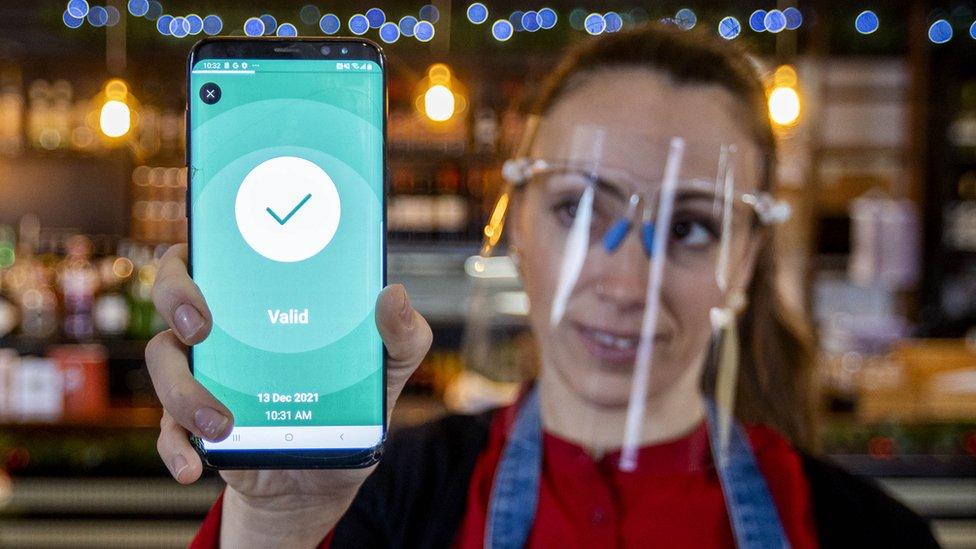
- Published16 February 2022
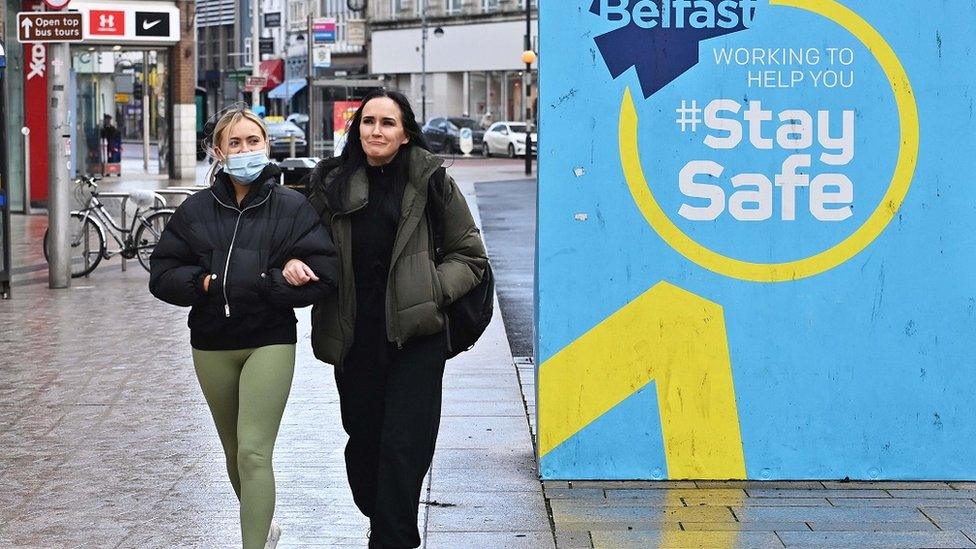
- Published19 January 2022
